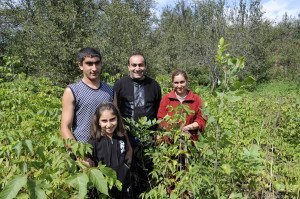
WATERTOWN, Mass.—A case study about the Armenia Tree Project Backyard Nursery Micro-Enterprise Program has been accepted as part of the proceedings of the XIII World Forestry Congress in Buenos Aires.
The international gathering is taking place on Oct. 18-23, and the abstract will be presented as a poster at the meeting and published in the proceedings of the World Forestry Congress. ATP will be represented at the meeting by long-time supporter Arman Farmanian.
“We are honored to be a part of this international gathering of forestry professionals and development experts, and look forward to presenting our work with colleagues from around the world during the poster sessions at the thirteenth session of the World Forestry Congress,” said ATP deputy director Jason Sohigian.
The poster covers the issue of deforestation in Armenia and the founding of ATP in 1994, and provides an overview of the Backyard Nursery Micro-Enterprise Program, which received an Energy Globe Award for Sustainability at the European Parliament. “The organization identified a remote area in northeastern Armenia that was isolated by landslides caused by deforestation and employs its refugee population to grow seedlings to replenish their local forests,” explains Sohigian in the case study.
“The Backyard Nursery Micro-Enterprise Program is a good example of a sustainable development project since it provides economic (employing families to grow seedlings), social (partners provide needed services such as school lunches, computer access, health care), and environmental (reforestation to address desertification, landslide/erosion problems) benefits,” concludes Sohigian in the peer reviewed abstract.
“ATP is fortunate to be represented by Mr. Farmanian at this meeting, and we are planning to take advantage of the sessions on forest management, sustainable development, and ecosystem services in order to build our capacity and expand our programs in Armenia,” added Sohigian.
To view a PDF of the ATP poster being presented at the XIII World Forestry Congress in Buenos Aires, please click here: http://www.armeniatree.org/atpnews/news.htm


Thank you for your coverage – here is the link to view the ATP poster presented at the World Forestry Congress in Buenos Aires: http://www.armeniatree.org/pdf/wcf_atp_poster.pdf